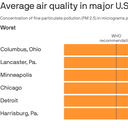Midwest cities had worst air quality in U.S. in 2023: report

The U.S. cities with the worst air quality in 2023 — mostly in the Midwest — had particle pollution levels two to three times higher than what the World Health Organization (WHO) recommends, according to a new report.
The big picture: It's not coincidental that the cities with the worst air quality last year were in the Upper Midwest and Mid-Atlantic, as those regions were smothered in smoke from Canada's unprecedented wildfire season.
- After decades of progress, air quality in the U.S. is expected to steadily deteriorate over the coming decades as climate change causes more large wildfires, heat waves and drought.
- Most U.S. cities had levels one to two times higher than WHO guidelines, while pockets of the West met the guidelines, according to the report.
Why it matters: Air pollution is the world's leading environmental health threat, causing 6.7 million premature deaths every year, according to WHO estimates.
How it works: The report is from IQAir, a Swiss air quality technology company that maintains a global air quality system that continuously measures contaminants in thousands of cities across the world.
- The report examines the average level of fine particles less than 2.5 microns (PM2.5) in diameter — a particularly dangerous form of air pollution because the solid and liquid specks can penetrate deep into lung passageways.
- Inhalation of PM2.5 can exacerbate pre-existing lung and heart conditions. Evidence suggests it can also have neurological effects.
- Much of the fine particulate matter pollution in the U.S. and around the world is a byproduct of fossil fuel combustion and industrial activity, as from car engines or concrete plants. Other drivers can include everything from dust storms to volcanoes, cigarettes and air fryers.
Go deeper ... Study: More tiny plastic particles in bottled water than previously thought